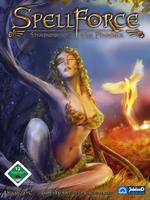|
|
|
Main News Forums Games Games Database Top 100 Release List Support Files Features Reviews Previews Interviews Editorials Diaries Misc Download Gallery Music Screenshots Videos Miscellaneous Staff Members Privacy Statement |
RPGDot: In AO, we were introduced to vehicles. These were not independent things that could be parked, stolen, sat upon, etc - they were very lame morphings of the character into the vehicle (i.e. man becomes car). In SOL (EQ) this will be repeated. In DAOC, their vehicles amount to buy ticket and sit on horse till it gets to the destination (whereupon it disappears) or jump off en route. Will your game have vehicles? Will the character models 'morph' into the vehicle, be forced to only go along vehicle routes or will the vehicles be completely separate from the characters? What about vehicular combat (the pride and joy of ALL vehicle owners)? Can I run someone over with an ox cart? A dragon? Paul: I can't really tell you what "vehicles" are like in our game because we haven't implemented them yet. We certainly want to have them, and we want to do them well, but we're in the process of figuring out the cost in assets and gameplay to do them correctly. As we decide how they'll work, I'm sure we'll let everyone know. RPGDot: Will characters be able (upon release) to make vehicles? Enchant items? Shawn: If there are vehicles that players will be able to make use of on a permanent basis in the game, there will be trade skills in the game allowing for their construction. They may be their own unique skills, or part of a skills already in place. As of right now though, we are still designing the various methods and means of transportation we want in the game, so the trade skill system has yet to be meshed with that. RPGDot: Will you have item degradation or will you limit the quantity/quality of items in the world through camping, etc.? Shawn: No item degradation in Horizons. No quantity/quality limitations of finished items in Horizons. We have the ability, however, to regulate the rate at which natural resources are introduced into the world... which honestly is really freaking cool. If there is an over-abundance of Iron in the world, so much that there is a real glut, we can turn down the rate at which it is introduced. RPGDot: Will you have areas in your world, which are extraordinary? IE - Dreamscapes, floating castles, etc [As was seen in Clive Barker's 'Undying' game]? Steve: You'll have to wait and see on this one. The team has some very cool ideas as to how they want the world to look, which I think everyone will enjoy. 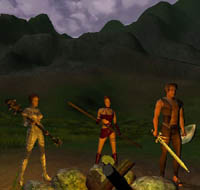
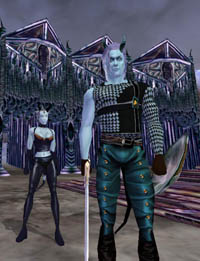
RPGDot: What excites you about playing this game? Shawn: Honestly, the fact that we're designing a game that doesn't have a lot of the frustrating things other games of the genre sometimes incorporate into their design. While we aren't handing out "A WINNER IS YOU" buttons to everyone who logs in, we aren't making you try and draw blood from a rock either just to have some fun. I guess the main thing is that Horizons is going to be VERY fun to play. Dina: Hmmm... I think most importantly I am looking forward to the communities that will form and be built using our game systems. I mean, it's one thing to be playing a game and another to actually feel like PART of the game, and I think we're going a long way to show that to our players. I'm particularly looking forward to the live events, but I am biased about that =). I also like the fact that my character can experiment with so many of the different skills and schools and not feel punished for belonging to a school I later regretted joining. I'm pretty picky about how I customize my characters and Horizons lets me do everything I could want without worrying about changing my decision later. RPGDot: What other on-line games [MMOLG's/MMORPG's] do you or have you played? What excites you about those games that you have/had played? Paul: I love these games. I've been playing them since Meridian 59 and UO, and I try to play each and every big one that comes out. I played UO until I was driven away by exploiters and people who were only out to spoil other people's good times. I started playing EQ when it was released, and still poke my nose in occasionally to have fun or go on a raid with the friends that I made there. I played DAOC, AC, and AO for a couple months after each of them came out but they didn't hold my interest after I got past the early excitement of a new game. Shawn: I've tested/casually-played/religiously-played a metric ton of them: Ultima Online, Everquest, Anarchy Online, Dark Age of Camelot, Jumpgate, Shattered Galaxy -- the list goes on. Dina: Although I used to be a pretty hardcore MUDder, I've played UO, EQ, DAOC, and AO rather extensively. What has always excited me most is the level of interaction available between the players and the game through things like quests, adventuring, live events, and forming guilds. Being able to influence the world and adventure with other players cooperatively. Another aspect is being able to customize my character, through item acquisition, appearance selection, and skills. And being able to feel that your character is as unique as possible in a world of thousands of players is huge. RPGDot: What do you consider the most important lessons you've learned, both as gamers and as developers, from other online games you've played? Paul: Each of these games has taught me things that I'm trying to carry through to Horizons. I've learned about the value of a good quest system, the perils of involuntary PVP, the fun of consensual PVP, the value of a good tradeskill system, the importance of balancing characters' abilities, good and bad death penalties, don't take shortcuts on testing, and much more. Shawn: The big picture: don't aggravate a player because you (as a designer) think you are being realistic or clever. Remember that a game is supposed to be fun to play, not a hyper-realistic representation of virtual drudgery. Dina: Not to ever underestimate the ingenuity and dedication of players. Test everything, and when you've finished testing it, test it some more. Content is also key. Creating a game with a good amount of content is one thing, but consistently delivering good content is another. RPGDot: What are the death penalties? Will you lose experience? Skills? Items? Paul: Our view is that death penalties in other games are too harsh. We don't want a player to have WASTED six hours of game time grinding experience, only to lose it all due to one mistake or a burp on the Internet, or spend months collecting everything they need to create the ultimate long sword, only to lose it the next time they step outside the city gates. RPGDot: Will there be static spawns? Static loot? Paul: In general, there will not be static spawns. Areas of the world will be designated to produce certain monsters. Those monsters can appear anywhere in that area, and most of them wander around. Players really can't just sit in one spot waiting for the zombie to spawn next to them every 20 minutes. They need to explore an area hunting for things to fight. 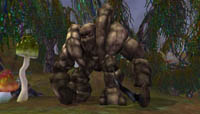
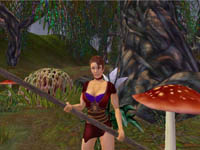
RPGDot: What is your favorite aspect of your game? Paul: At this early stage my favorite aspect is still creating a system and watching it appear in the game world. It's quite a rush to watch the game world work the way you envisioned. Shawn: All the stuff I have designed, of course! ;) Dina: Where to start? Right this moment I am really impressed with the spell system. I think we're going to have some unbelievable spell effects. RPGDot: Aside for the fact that the game is not yet out, what is your least favorite aspect of your game? Paul: Well, I'm not 100% happy with the current combat formula, but that's OK, because I wrote it, and can change it. That's the nice thing about working here. If I don't like the way something is working, then I go talk to whoever is in charge of it, and find out why it works that way, and if we can make it better, or if I'm just plain wrong about it. Shawn: The rate at which things come together to make a game of this magnitude is too slow for my taste. I totally understand why that is -- nothing happens overnight, but I'd still like to see it go faster. I got lots I wanna play and test, and I want to see it now, now, now! Dina: The endless testing and retesting of systems that usually ends up with my character being killed, especially when the monsters are being played by the other developers. I seem to be a popular target. RPGDot: What features will be coded into the game to allow guilds to be more than just 'glorified chat channels'? Steve: We are pushing to provide a more solid support and communication system for guilds. There are some very exciting proposals for guild support on the table here at AE right now. Such as guilds acquiring a larger plot of land as a single entity. Also some interesting sharing systems have been documented. But how much we get done in the timeframe is still foggy so I can't really commit to any of the bigger things we have planned. RPGDot: Your FAQ mentions that buildings can be built only in certain approved areas. How much customization is allowed? Will the buildings be from a menu or will a 'Lego building blocks' method be employed? Dina: Not only will you be able to build houses (and many other buildings) that come in many styles, shapes, and sizes, but also you will be able to decorate them inside and out however you wish. You can even set your own permissions lists so you have complete control over what happens to your property. RPGDot: Your FAQ mentions that buildings can never be destroyed and that only certain areas can be built in, presumably to prevent the 'urban sprawl' we have seen in UO. Aside from waiting for new expansions and hoping that they can join the 'land rush' to get an area for a house, how would someone get a building if the world is 'full'? Dina: Although we are planning to have an enormous amount of housing already available, some areas won't be ready for housing from the beginning. These areas might need to be cleared by completing quests, or killing monsters in the region. Also, players will be able to create new communities in areas of the world that are zoned for housing. You can also buy and sell property from other players easily and securely. It will be more likely that players will be faced with the difficult decision of which plot and to which community do they want to belong. RPGDot: Will housing have maintenance costs or degrade? Dina: Houses will not degrade. However, players might have to pay taxes on their property. Taxes!?! Yea, it sounds like a pain but it's actually not. This money is used to form communal buildings that are automatically constructed when enough money and resources are available. This covers many things, from town defenses, to community shops, to even things like travel gates! Players can always see where their hard earned cash is going. Putting money aside for this will be very simple, as it's not our goal to punish players who cannot always be in game every day by degrading or removing their property. 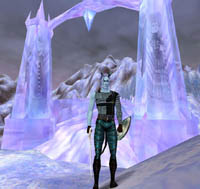
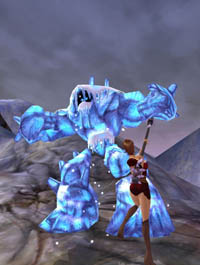
RPGDot: One of the major problems customers face with all released games is that of content. 2001 has a bad year for releasing games with actual content (AO, WW2OL, DAOC) - what can you say to reassure the nervous masses? Paul: Well, I can say that having played those games and seen how their content was used by the players that I'm very aware of and in favor of making sure we have plenty of content to keep players happy. We're adding a lot of systems to our game to keep the content flowing. I think our quest system is amazing, and should provide tons of stuff for players to do. I think our storyline is going to impress people, and keep them involved. I think our high level game will keep players coming back and never bored. Shawn: The designers of Horizons are well aware that content drives the experience of a MMORPG. There are people working on Horizons who have made their living designing and developing nothing BUT content for other games you'd find out there. Our goal is to ship this product with tons of content for the end user, and to continually develop new content for it after release. RPGDot: To get our readers a bit into the 'business angle' of the MMOLG - what was the biggest hurdle you believe new designers have to hurdle when pitching the game to a producer? Paul: Artifact didn't really start that way. The founders didn't approach some big company with an idea that they wanted to try. They had an idea, went out and got the funding and the people to make that idea a reality. Shawn: The biggest hurdle, for me anyway, has been to learn that sometimes when you ask for a pony (in the figurative sense), you can't have one because it is technologically impossible or impractical. Once you design something, be ready to embrace chucking it completely in favor of a new design that is potentially completely different than what you tried before. Nothing is set in stone until everyone is on board, no matter how much time you've put into designing it.Dina: Yea, proving what you have is what will sell. Its one thing having an idea YOU think is good, but being able to say that most of your audience will enjoy it is even more important. There are always 'angles' for every game, promoting what is NEW to a game genre and staying consistent with what is tried and true as well. It's very important to stay open-minded and be receptive to others opinions and concerns while not straying from your team's design goals. There's a lot of compromise and brainstorming to overcome hurdles, but to me, that's all part of the process. RPGDot: Any additional comments you would like to add? Paul: Just that I think people are going to love this game when they see it. Shawn: I look forward not only for everyone out there to play Horizons, but also for me to play it myself! Dina: I just wanted to thank so many of the fans that have been following us from the early stages. It's been an interesting process for all of us :)
Average Reader Ratings: 10 (1 votes) |
|||
|
All original content of this site is copyrighted by RPGWatch. Copying or reproducing of any part of this site is strictly prohibited. Taking anything from this site without authorisation will be considered stealing and we'll be forced to visit you and jump on your legs until you give it back. |
||




